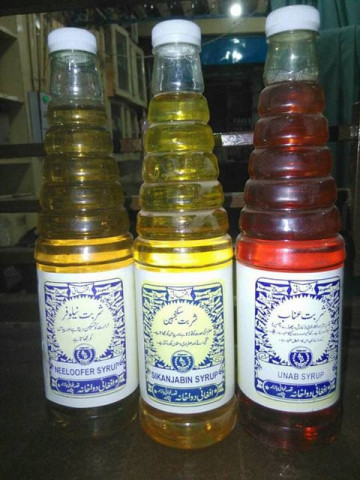Beating the heat with locally-manufactured herbal syrups in K-P, FATA
Small-scale manufacturers say their customers prefer locally-made syrups over branded red syrups

Each hakim has his own unique formula passed on from generation to generation and it is a fiercely guarded secret recipe. PHOTO: Riaz Ahmad/EXPRESS
The most popular medicinal syrup used in the summers across K-P and Fata as well as parts of Afghanistan is Sharbat-e-Bazoori made of endive roots, endive seeds, cucumber seeds, grape vinegar, honey, and sugar. Local manufacturers say these plants are known for their medicinal value and have been used in the sub-continent for centuries to keep the body refreshed and to beat the heat.
Even though red syrups and other factory produced concentrated syrups remain commercial successes, small-scale producers of such products feel they are not in competition with the giants and do not want to be compared to them.
How Ramazan’s blessings flow for the beverage industry
“Our brand has been in production since 1880 when our clinic and small-scale manual manufacturing unit was first established in Peshawar,” claimed Hakim Abdullah, a third generation hakim who owns Afghani Dawakhana in Qissa Khwani market.
There is no publically available research to determine the market share of syrups produced by small-scale manufacturers, but Abdullah estimated it is about 20 per cent.
According to Abdullah, the red syrup formula which you can mix in water for a refreshing drink is a centuries-old recipe and only became commercialised when some people started manufacturing it in large factory plants.
“Our own red drink is made of several types of fruits and we produce it by hand in the old traditional way,” claimed Abdullah.
The ingredients of these syrups – various fruits and herbs – are boiled in a pot of water till the mixture thickens, then sugar and honey are added for sweetening.
He said each hakim has his own unique formula passed on from generation to generation and these are fiercely guarded secrets.
Abdullah produces syrups that are mostly believed to be medicinal in nature, with exotic titles like Sharbat-e-Sandal, Annar, Anab, Nelofer, Sakanjabeen and Bazoori. He claims people have been consuming these products for centuries to ward off the brutal summer heat.
Toxic cough syrup kills 16 in Lahore
Although these manufacturers claim the quality of their product is the basic selling point for their syrups, the other main attraction is the relatively lower prices.
Safdar Khan who runs a general store in Bannu, was recently in Peshawar to stock up on these products.
“People ask for the syrups produced in dawakhanas because it is widely believed that they are made of natural herbs and original ingredients while the ones made in factories are chock full of chemicals,” he said. “It helps that they are cheaper too.”
An 800ml bottle of Rooh Afza can cost up to Rs170, while the locally produced syrups sell for Rs120 a bottle.
According to Safdar, Sharbat-e-Bazoori is the most popular brand, followed by sandal, while mango and banana flavours are also very popular.
Even though herbal treatments and tonics have existed in the subcontinent for centuries, there is no local research available on the medical efficacy of herbs used in them. However, in western countries, there is a growing trend of people turning to natural plants and herbs as alternative medicine.
Popular syrup: In the land of Rooh Afza
While speaking to The Express Tribune, physician Dr Sohail said there is no scientific proof to show these ingredients work, but there has been some research done in the west that has shown the medicinal value of some of these herbs.
He added that local doctors also prescribe herbal treatments where appropriate.
“I myself prescribe ispaghol (husk) to patients suffering from stomach problems,” he said. “The herbal sector should be studied and developed further so that people in far-flung areas who have no access to medicines can benefit from herbal treatment instead."



















COMMENTS
Comments are moderated and generally will be posted if they are on-topic and not abusive.
For more information, please see our Comments FAQ